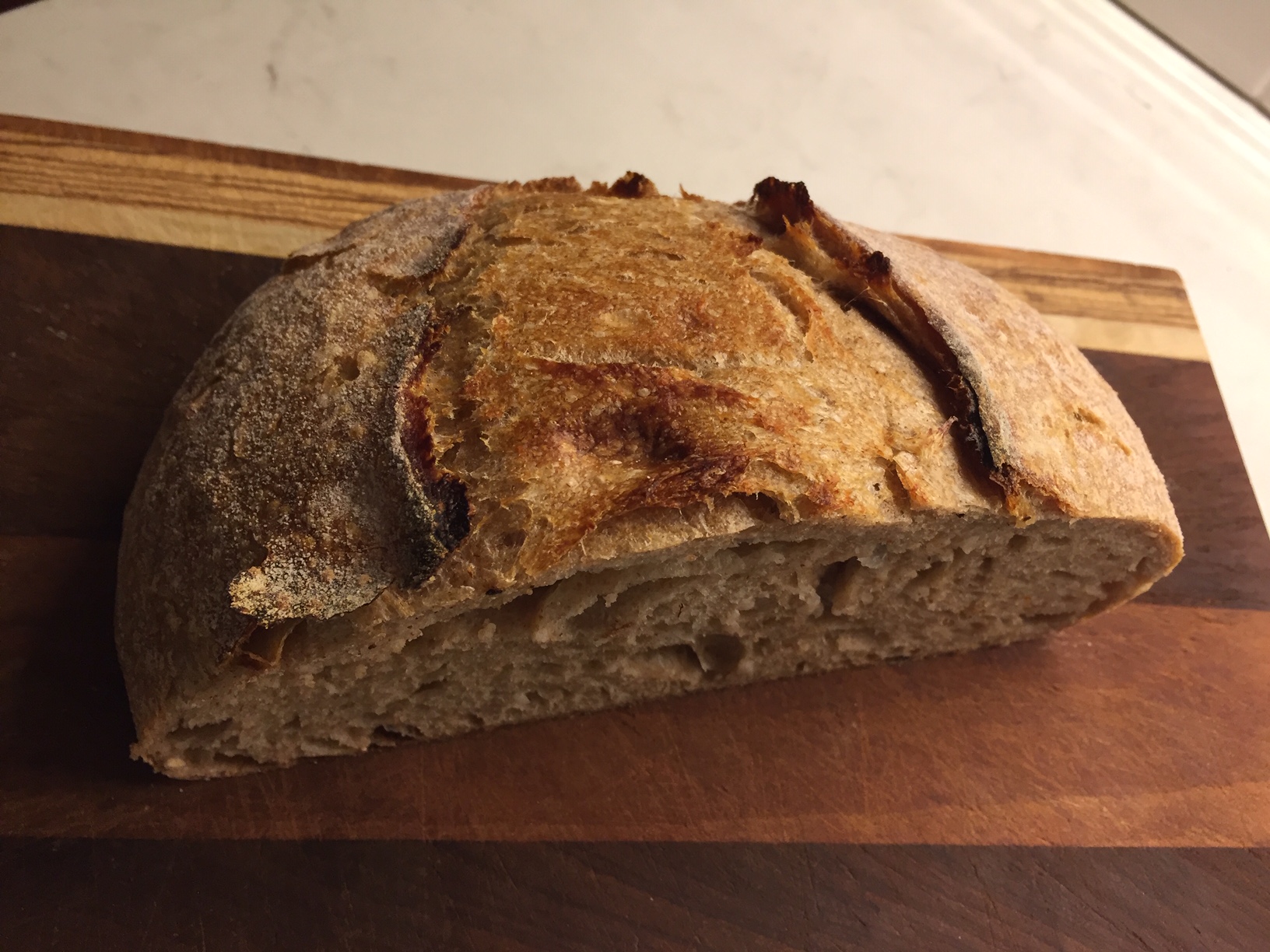
Sourdough with rye-scald

After discovering a couple videos and articles about scalding flour, I tried adapting my usual sourdough recipe to incorporate a rye scald, and I'm very happy with the result.
I've mostly been baking a variation on the Tartine country loaf, using (for 2 loaves) 400g whole wheat flour, 600g bread flour, 200g levain, 775g water, and 20g salt.
For this bake, I used 200g whole wheat flour, 200g dark rye flour, 600g bread flour, 200g levain, 875g water, and 20g salt.
The night before baking, I boiled some water, let it cool to 180°F (82°C), then poured 400g of it over the rye flour (200g) in a bowl. I mixed to incorporate, then covered it and set it aside. Meanwhile, I made my levain as usual.
The next morning, I proceeded as usual, but included the (now cooled) scald in the mix. It was stickier than usual (due to the rye), and a bit more liquidy than I had intended, so I thought I might've increased the hydration by too much, but in the end it turned out well. Good rise, nice crust, and a really moist and lacy crumb with a hint of sweetness. The only thing I'd change next time would be to bake it a little longer.
I used the following references/inspirations to piece this together:
- https://youtu.be/aZ1W8xa80eM
- https://theryebaker.com/on-scalds-and-scalding/
- https://www.chainbaker.com/scalding
- https://youtu.be/_XZGGPxydKs



Yes, I've been learning that scalding all or part of the flour, or even just the bran that I sift out, can improve the flavor. With some all-buckwheat loaves, I think I've learned that scalding just part of the flour can lead to very good bread: between Abe and myself it appears that scalding 40% of the stone-ground buckwheat flour worked better than scalding 60% (the crumb was firmer and less crumbly).
So there's lots of room left for experimenting, but scalds can definitely be good.
TomP
Hello. I understand the water does not have to be at the boiling point to work, but am curious as to why you took an extra step to allow the water to cool to 180°F instead of using it immediately.
Personally, I've just been dumping boiling water on the flour and then stirring. There is a related process of holding the flour/water mixture at about 160 deg F/71C for hours to let enzymes break out sugars (much over that temperature and the enzymes stop working and denature) which will bring out some sweetness.
The way I see it, when you dump hot or boiling water onto a mass of room temperature flour, most of that water will cool down far below boiling as it encounters the cooler flour. No matter how you do it you won't be able to control the temperature of the water as it mixes with the various parts of the flour. The most I am looking for is that most of the flour gelatinizes and bran bits soften.
If you want to hold the flour with water at 160 deg F, you need to cook it at that temperature for best results.
One of the articles I read mentioned the effects of temperature:
https://breadtopia.com/scalding-experiment-with-spelt-sourdough/
I figured I'd aim for 180°F so the inevitable cooling that occurred as the water hit the flour might still put me in the 160°F to 180°F range. Other resources I saw poured nearly boiling water directly over the flour. I'll probably try that soon.
I might also try the method where you actually cook the water and flour on the stovetop to keep it in the desired temperature range, although I understand that also leads to more water loss through evaporation.
There are two extreme versions of scalding. In the first one the goal is conversion, that is breaking of starch into digestible sugars. Starches don't "denature". To do this it is best not to exceed 65 °C limit. The success also depends on the diastatic power of flour, which can be very low these days. The second method is gelatinization. The aim here is to crack the starch granules open and make starch more accessible to yeast and LAB. This is the one where you hit flour with boiling water.
Both methods speed up fermentation to about the same degree, and both, when the difference in hydration is accounted for, can produce a very similar bread. There also hybrid methods like the one you describe - add hot watter and hold kind, but more often than not it's a total crapshoot.